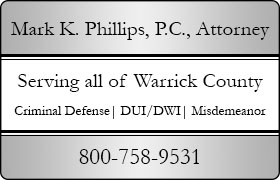Tennyson Criminal Lawyer, Indiana
Sponsored Law Firm
-
 x
x

Click For More Info:
-
Law Offices of Mark K. Phillips
114 South Third Street P.O. Box 427 Boonville, IN 47601» view mapDUI-DWI, Criminal Defense, Personal Injury Top Rated Indiana DUI Defense Lawyer
I offer passionate, loyal and fierce representation. I have over 20 years of experience to fight your Indiana DUI charge. I offer a free, initial consultation.
800-291-416 -
- Contact
- Free Consultation
- Visit:
- Website
- Profile
Mark Kelly Phillips
✓ VERIFIEDDUI-DWI, Criminal, Personal Injury, Family Law, Accident & Injury
I am the proud father of three wonderful young men, two of whom are now in practice with me, and the youngest, who is a junior in high school, who hav... (more)
Bob Edward Zoss
✓ VERIFIEDDivorce & Family Law, Criminal, Wills
I Take Your Legal Issues Personally.
Robert E. "Bob" Zoss Sr. was born and raised in South Bend, Ind. He is a 1967 graduate of Howe Military School, where he rose to the rank of cadet cap... (more)
Sherry Darlene Smith
Juvenile Law, Family Law, Divorce & Family Law
Status: In Good Standing Licensed: 22 Years
Kurt Alan Schnepper
Estate, Divorce & Family Law, Criminal
Status: In Good Standing Licensed: 24 Years
Samuel Adam Long
Family Law, DUI-DWI, Criminal, Consumer Protection, Personal Injury
Status: In Good Standing
Terrell Ray Maurer
Divorce, Child Custody, Divorce & Family Law, Criminal
Status: In Good Standing Licensed: 39 Years
 Mark K. Phillips Boonville,Indiana
Mark K. Phillips Boonville,Indiana About UsMark K. Phillips
About UsMark K. Phillips Contact UsCall or Email Now
Contact UsCall or Email Now


